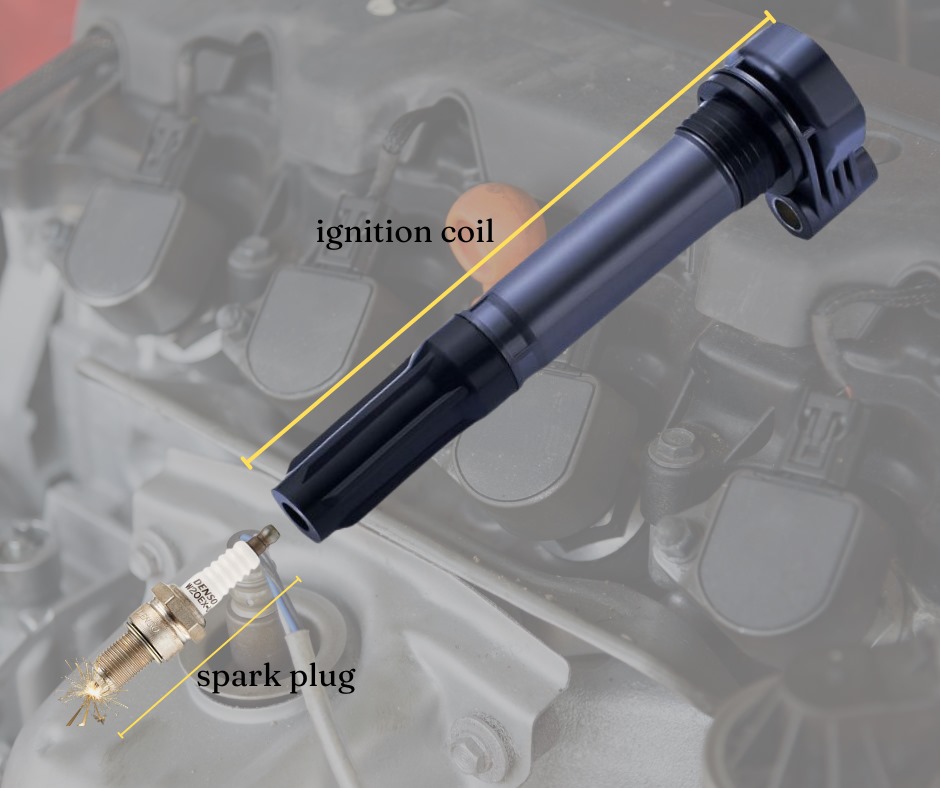Understanding the Functions of an Ignition Coil and When to Replace It

An ignition coil plays a vital role in your vehicle’s engine, ensuring smooth performance, fuel efficiency, and reliable starts. But like all car components, ignition coils can wear out over time. In this blog, we’ll cover the functions of an ignition coil, how it works, and the signs that indicate it may need replacing.
What is an Ignition Coil?
The ignition coil is an essential component in a vehicle's ignition system. Its main job is to convert the low voltage from your car’s battery into the high voltage needed to create a spark at the spark plug. This spark ignites the fuel and air mixture in the engine, producing the combustion necessary to power the vehicle.
How Does an Ignition Coil Work?
Ignition coils operate through electromagnetic induction, a process that transforms a battery’s 12 volts into the thousands of volts required to ignite the air-fuel mixture. Here’s how it works:
- Low Voltage Power: When you turn on the ignition, the battery supplies a low voltage to the ignition coil.
- Electromagnetic Induction: The ignition coil uses copper wire windings to amplify the voltage through electromagnetic induction.
- High Voltage Output: The amplified voltage flows from the coil to the spark plug.
- Spark Creation: This high voltage creates a spark across the spark plug’s gap, igniting the air-fuel mixture in the combustion chamber.
Each cylinder in an engine has its own ignition coil or shares one with other cylinders in some engines. These coils work in harmony with the engine’s firing order to keep it running smoothly and efficiently.
Key Functions of an Ignition Coil
Ignition coils have several critical functions within a vehicle’s ignition system. Here are the main roles they play:
- Voltage Transformation: The primary function is to boost the battery's voltage to create the spark needed for ignition.
- Reliable Starting: Ignition coils provide the necessary voltage for a quick and consistent start.
- Fuel Efficiency: A properly working ignition coil helps ensure efficient combustion, improving fuel economy.
- Smooth Engine Performance: A well-functioning ignition coil keeps the engine running smoothly, minimizing misfires and rough idling.
Signs of a Failing Ignition Coil
Knowing the signs of a bad ignition coil can help you identify issues early on. Here are common symptoms of a failing ignition coil:
- Difficulty Starting the Vehicle: A weak or failing ignition coil may cause hard starting or no-start situations, especially in cold weather.
- Engine Misfires: If the ignition coil isn’t providing sufficient voltage, you may experience engine misfires, which can feel like hesitation or jerking while accelerating.
- Reduced Fuel Economy: A faulty ignition coil can reduce combustion efficiency, leading to increased fuel consumption.
- Check Engine Light: A failing ignition coil often triggers the check engine light, as the engine’s control module detects misfires or other issues.
- Rough Idling or Stalling: Poor spark due to a bad ignition coil may lead to rough idling or stalling at low speeds.
- Unusual Noises: Clicking or popping sounds may occur when the ignition coil is struggling to maintain a steady spark.
When to Replace an Ignition Coil
Ignition coils are durable components, but they do wear out over time. Here’s when you should consider replacing yours:
- Every 60,000 to 80,000 Miles: Most ignition coils last between 60,000 and 80,000 miles, depending on the vehicle and driving conditions.
- When Experiencing Symptoms: If you notice any of the symptoms above, it’s essential to have your ignition coil inspected by a mechanic.
- As Part of Regular Maintenance: Replacing ignition coils is often part of scheduled maintenance, especially in high-mileage vehicles.
A malfunctioning ignition coil can lead to further engine issues if left unchecked. Replacing it in a timely manner not only ensures a smooth drive but also prevents costly engine repairs down the road.
Choosing the Right Replacement Ignition Coil
When it’s time to replace your ignition coil, choosing a high-quality part is essential. Here are a few tips to help you find the right replacement:
- Quality Matters: Opt for a quality ignition coil from a reputable brand to ensure performance and longevity.
- Match Your Vehicle: Check that the ignition coil matches your vehicle’s make, model, and engine specifications.
- Professional Installation: If you’re unfamiliar with car repairs, have a professional mechanic replace the ignition coil for optimal performance.
Final Thoughts
The ignition coil is a small but powerful component of your car’s ignition system, critical for starting, fuel efficiency, and smooth engine performance. By knowing its functions and recognizing the symptoms of failure, you can keep your car running reliably. If you’re experiencing any signs of ignition coil trouble, don’t wait to have it inspected and replaced if necessary.
By following this guide, you can ensure a smooth-running engine and avoid issues that could lead to more extensive and costly repairs. For a reliable, efficient ride, keep an eye on your ignition coil’s health and enjoy a well-maintained vehicle.

 Loading..
Loading..